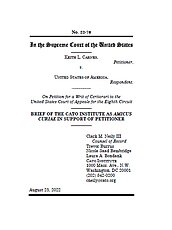Learn more about Cato’s Amicus Briefs Program.
In 2013, Keith Carnes was pulled over by police. The officer smelled marijuana, which Mr. Carnes admitted to smoking earlier that day. Mr. Carnes also informed the officer that he possessed a registered handgun, which the officer found in his waistband during a pat-down search. Mr. Carnes was charged with driving under the influence, but those charges were eventually dismissed.
Three years later, Mr. Carnes was in court on new criminal charges. One of the charges alleged that Carnes was an “unlawful user” of a controlled substance—marijuana—and was therefore prohibited from owning or even possessing a firearm under federal law. The charge stemmed from the 2013 stop where Mr. Carnes admitted to smoking marijuana on the same day he was found in possession of his firearm. The question of what makes someone an “unlawful user” of controlled substances is unclear, but most lower courts have interpreted it to require some degree of regular drug use—meaning one-time use is not enough to sustain a conviction. The Eighth Circuit, however, disagreed, and it affirmed Mr. Carnes’s conviction even though the government only had proof of one-time marijuana use in 2013.
Carnes has asked the Supreme Court to review his case, and Cato has filed an amicus brief in support of reversing the Eighth Circuit’s decision. Under the Eighth Circuit’s holding, anyone who has ever used a controlled substance even once can be permanently disarmed. The Second Amendment requires more.
The Second Amendment protects an individual’s right to keep and bear arms and any attempt infringe on this right requires affirmative proof that such action is justified by the amendment’s text, history, and tradition. The importance of historical analysis was emphasized by the Court in its recent opinion in New York State Rifle & Pistol Association v. Bruen. That case was decided before Carnes’s case, so the Court has an opportunity to clarify how to apply the Bruen decision.
Cannabis, and of course alcohol, were common in the Founding era, and so were guns. While there were some old laws that punished people for using or carrying guns while intoxicated, punishing someone for having a gun because they had once been illegally intoxicated is unknown in American history until at least the mid-20th century. And, according to recent polls, 49 percent of Americans have tried marijuana at least once. It would be constitutionally absurd to claim that all those people no longer have the right to own or possess a gun. Moreover, “unlawful users” of controlled substances are much broader than users of Schedule I drugs like marijuana or heroin. Someone who takes a Xanax prescribed to their friend, or a spouse’s prescription sleeping pill on a long flight, is also technically an “unlawful user.”
The Supreme Court should grant Keith Carnes’s petition for certiorari. This case presents an ideal opportunity for the Court to articulate and update the relevant analytical framework for lower courts. Without guidance, lower courts will continue watering down the Second Amendment by allowing the government to strip individuals of their right to keep and bear arms without proper justification.

This work is licensed under a Creative Commons Attribution-NonCommercial-ShareAlike 4.0 International License.



